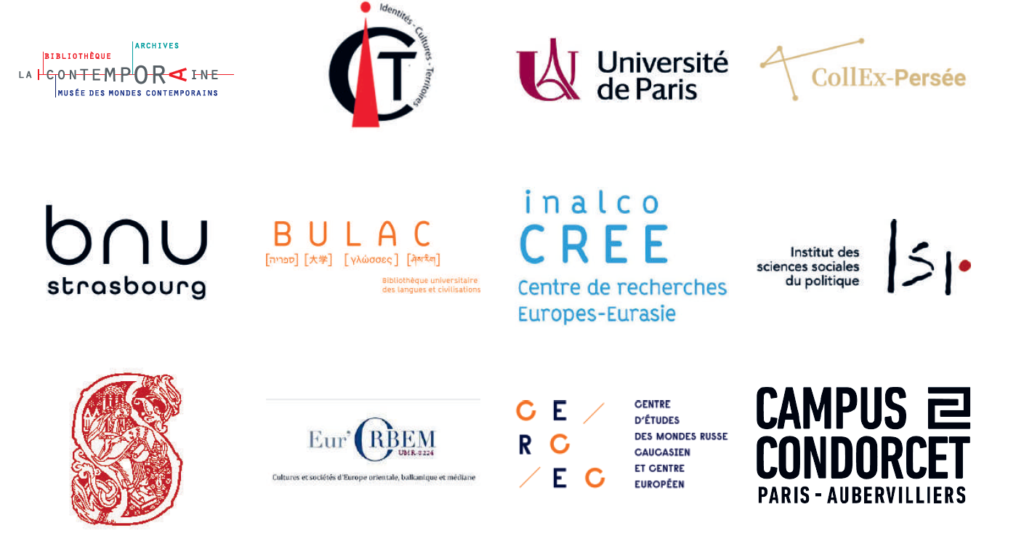CFP: Dissidents and Exiles from Socialist Eastern Europe and the USSR: History, Archives and Memories (1945-1991)

Call for Papers (pdf)
Final International Conference for the CollEx Persée Project DISSINVENT
Dissidents and Exiles from Socialist Eastern Europe and the USSR:
History, Archives and Memories
(1945-1991)
June 2-3, 2022
Organization:
La contemporaine Bibliothèque, archives, musée des mondes contemporains (Nanterre) – University of Paris
Université de Paris, research center ICT L’Europe dans les mondes
Partner institutions:
Bibliothèque universitaire des langues et civilisations (BULAC), Bibliothèque nationale et universitaire de Strasbourg, Institut d’études slaves, UMR Centre d’études des mondes russe, caucasien et centre-européen, UMR Institut des sciences sociales du politique, UMR Eur’ORBEM, Centre de recherche Europes-Eurasie.
As a land of refuge for successive waves of immigration from Russia, the Soviet Union and Central and Eastern Europe, France was one of the main receiving countries for dissidents coming from the European socialist bloc during the long Cold War. For many, France was a platform of passage toward the United Kingdom, Germany, North America or Israel, while others settled in the country permanently. By virtue of France’s active political and associational fabric, dissidents and political exiles could connect to their communities in the diaspora, but also with French institutions and with other groups or individuals who remained in the East. These men and women produced a significant documentational heritage that is still today relatively unknown, and which is often under the threat of extinction. To a great extent, this heritage concerns their activities in the domain of publishing, artistic creation, and research, as well as their political commitment in what we can very broadly call the “dissidence(s)”. Very often, dissidents themselves were responsible for the public and private collecting of documentary heritage. As collectors, donors or even sometimes becoming archival professionals, some of them were even in charge of treating and disseminating these collections. Thus, they were sometimes able to fashion their own history, and they were often sought, especially from the 1990s onwards, as witnesses of the historical past for manifold audiovisual productions.
Recipient of a grant from the CollEx-Persée in 2020, the project DISSINVENT aims to identify and increase the national and international visibility of the collections produced by Eastern European dissidents exiled in France between 1945 and 1991, also working toward improving their accessibility.
These unknown archival fonds have to be identified and better described in their wide diversity, also bearing in mind the transversal challenges posed by the current digital transformation. The aim of the project is to simultaneously develop a reflection on these very singular collections, not only on account of their provenance (having been produced by intellectuals, artists and scholars, political and trade union activists, associations, and publishers), but also considering the diversity and fragility of the documentary corpus (ego-documents, gray literature, books of lesser circulation, clandestine publications of the samizdat type, diverse objects attesting to their production, leaflets, posters, pictures, films, oral testimonies) and the politically and emotionally shaken history that lies behind them.
The present call for papers invites researchers working in diverse disciplines, as well as archival professionals and librarians, and witnesses and actors from this historical period that is currently drifting away. It seeks thus to contribute to enriching the dialogue developed by projects funded by the CollEx Persée.
Proposals for papers can deal with one or many of the following subjects:
1) Histories and circulations of fonds and collections produced by the dissidents and exiles of Eastern European socialist states, created or deposited in France or other countries after 1945. Some of the questions to address are: can we talk about transnational clandestine/militant/exile corpora? How can we classify the producers (writers, artists, scientists, professors, publishers, trade union activists)? What was the role of Cold War diplomacy, of migrant smugglers, of surveillance and censorship agents in the history of these collections? For which reasons do archival producers keep or deposit their own archives or those belonging to their family? What is the place can these collections have in the national cartography project carried out by the CollEx Persee?
2) Status and treatment of fonds and collections. Some of the questions to address are: who do these fonds belong to? What is the legitimacy of procedures for archival displacement and repatriation after the fall of Communist regimes? How to identify, keep, catalog and disseminate such heterogeneous documentation made of ego-documents, leaflets, objects, magazines, images, and others? How to consider the linguistic diversity of these collections, translate and diffuse the inventories and fonds’ information notices? Can digitization potentially erase the singularity of these corpora?
3) Access and use for history, social sciences and literature. Among the questions to be addressed: what are the particulars of access to such sources, in terms of legal framework and/or institutional practices? What do we do with oral testimonies gathered during research? How do we reflect upon experiences of opening and closing of archival fonds, and of documentary losses? What are the specificities of these sources, and more generally of the memory of Eastern European exile and dissidence in relation to other diasporas? Are these sources particularly sensitive concerning matters of emotions, revelations, processes of lustration and literary uses?
The deadline for proposals is March 18, 2022. Proposals in French or English and containing a title, a summary of up to 300 words, a short bio and a selection of publications by the author(s) must be sent to: dissinvent@gmail.com.
The conference will preferentially take place on site in Nanterre, France. Online presentations may also be accepted.
Funding for travel and hosting arrangements is potentially available. Demands will be considered on an individual basis. Young researchers (Master and PhD students, postdoctoral researchers) are welcomed to apply. A number of contributions will be gathered and published in a special issue of the magazine Matériaux pour l’histoire de notre temps in late 2022.

